The following is based on the remarks that Senator Tim Kaine delivered at the Brookings Institution on July 19, 2017, at an event titled “A 21st century Truman Doctrine?: U.S. foreign policy with Senator Tim Kaine.“
This year, 2017, is the 70th anniversary of the Truman Doctrine. That doctrine was a grand strategy; it was a comprehensive foreign policy and national security strategy, and it lasted until 1991—through presidents and Congresses of both parties. That seems virtually impossible now. And so the thought experiment was to extract lessons from the Truman Doctrine—could we conceive of a similar sort of grand strategy now that would be comprehensive?
It would not just be about military posturing. The Truman Doctrine had a lot to do with the Peace Corps, the race to the moon, and Fulbright Scholarships; it wasn’t just about military doctrine. It would be bipartisan. President Truman went to a very hostile Republican Congress in March of 1947 and he asked them to do something they didn’t want to do; and they did it. And finally, it was durable; the Truman Doctrine lasted for more than four decades. So could we do something like that in the 21st century that would be durable, that would be bipartisan, that would be comprehensive?
The seeds of the Truman Doctrine were planted in March of 1946; Harry Truman asked Winston Churchill to come to Westminster College in Fulton, Missouri to give a speech. The speech is famously known as “The Iron Curtain Speech,” though actually the title was “The Sinews of Peace: The Connecting Tissues That Create Peace.” But Churchill talked about the reality of the Iron Curtain and coined that phrase; he called upon the West, but led by America, to prevent war and fight tyranny.
A year later, President Truman suffered from horrible midterm elections. The Democrats lost both Houses. Then, as the new Congress came in—this entirely Republican Congress—Truman was faced with the realities of Soviet-backed insurgencies, primarily in Greece, but also in Turkey. He decided to go to Congress and ask a hostile, war weary Congress to make investments in these nations, and possibly others, to prevent war and to fight tyranny.
Congress went along with it. A couple of months later, in June 1947, Secretary of State George Marshall, speaking at the Harvard graduation, laid out this amazingly ambitious plan to rebuild the nations of Europe, including adversaries—not just France, not just Belgium, but also Germany, and eventually also Japan.
The odds seemed long that a hostile and war weary Congress, dealing with so many domestic challenges would spend some money on this. And yet they did. Those three speeches—Churchill, Truman, and Marshall—were the articulation of a basic American strategy. Acting through international institutions when at all possible, but often those wouldn’t be strong enough, we would act to prevent war and tyranny.
Now, tyranny ultimately was defined a reductivist way. It devolved down to where the Soviet Union wants to put up an “X,” we’ll put up an “O.” The Truman Doctrine was not perfect. Without it we might not have taken over the French colonial war in Southeast Asia; we wouldn’t have toppled the governments of Iran, the Congo, and Guatemala. There were many faults to the doctrine, and yet it is important that it lasted under presidents and Congresses of both parties, even though it was articulated at a time when the chances of its success seem tough. We think Congress is fractious now? I’m not so sure the odds weren’t even longer in 1947.
After the Soviet Union collapsed, what happened to the doctrine that had become defined by containing the USSR after 1991? There were many grand proclamations: We’re now at the end of history; society has evolved and liberal democracy will reign now and henceforth into the infinite generations. Madeleine Albright famously declared that the United States is “the indispensable nation.” We entered a non-strategic, very pragmatic, case-by-case world under the end of the George H.W. Bush administration and in the Bill Clinton administration, tackling things with a kind of American pragmatism. Pragmatism is very much who we are as people. Americans kind of tend to be suspicious of strategies; we like common sense and practicality. We went into a practical case-by-case mode on the foreign policy side without a strategy.
There were some successes. The first Gulf War saw wise restraint in pushing Iraq out of Kuwait, but then stopping at the border and not going in to knock over Iraq. The Irish Accords under President Clinton were another success. But case-by-case also leads you to incongruities. Case-by-case means your allies don’t necessarily know where you’re going. Why did we intervene in the Balkans and not intervene to stop genocide in Rwanda? When you look at that in the rearview mirror, an answer suggests itself that isn’t pretty. What is the organizing principle? How do the American public or allies or adversaries understand what we’re to do?
We had a theory that emerged as a result of the attack of September 11—the War on Terror. Terrorism remains a central challenge, but the War on Terror as an organizing principle was just too narrow, too focused on the military tool; there was not enough on diplomacy, on moral example, on trade, and everything else. It did not fully describe the magnanimity or the greatness of the country; and because of things like selling the Iraq War as a necessary step to reduce a WMD program that proved not to exist, that doctrine was discredited pretty quickly, even while terrorism has remained.
Then came President Obama, who I deeply support. President Obama was asked his foreign policy, his strategy: “Don’t do stupid stuff.” That is so Obama. I always find it comical when people assert what an ideologue he is. He is anti-ideology. He hates ideological constructs because he thinks they blind you to the reality of situations. If you pick a strategy, you’ll try to force things into your box rather than really grapple with the realities on the ground. So “don’t do stupid stuff” really explains President Obama.
He was willing to do risky things. The Iran deal was high stakes; but he was very focused on minimizing errors of commission. The problem is that there’s errors of commission and there’s errors of omission, and what I’ve said about the “don’t do stupid stuff” doctrine is, if that’s your doctrine, you can sometimes not do stuff that is stupid not to do. It leads you to not take a more firm position with respect to Syria before millions of refugees had left the country. It leads you to dither and not take dramatic action when the government of Russia is cyber hacking an American presidential election. The fear of doing something stupid can sometimes paralyze you from doing something you need to do, and then the sin of omission becomes equally problematic.
Testimony in the Senate Armed Services Committee struck me and then made me start to think about this. According to one of our senior military leaders, who is still in service in the present administration, we have “O-plans” but no strategy. We have operational plans and contingency plans for everything, but what’s the strategy that unifies them? We can pull out the plan about North Korea, or pull out the plan about the South China Sea, but what is the strategy that unifies them?
The starting point of Churchill’s speech, and the starting point I think if we were to think about grand strategy today is, what is the arrangement of power in the world? Truman was dealing with the bipolar Soviet bloc and Western bloc; the reality of power today is tripolar: it is democracies, authoritarians, and non-state actors. The non-state actors, especially non-states using violence to achieve their ends, is a significant factor in the world that Truman was not grappling with. We’ve got to have a strategy as a nation to deal with each—the democracies, the authoritarians, and the non-states. We have to shore up the democracies; we have to challenge the authoritarians; and we have to defeat the non-states—at least insofar as they want to use violence to achieve their ends.
Democracies are spreading across the globe. But they face major challenges.
A word about the democracies; there’s good news all over the globe. Democracies are spreading across the globe. But they face major challenges: economic challenges like the eurozone; political challenges like Brexit; human rights issues like increasing anti-Semitism. We’ve taken the democracies for granted. “They’ll probably be okay,” we’ve said, “we should be worried about authoritarians,” or worried about others.
We can’t take democracies for granted anymore because democracies are showing signs of wear and tear, including our own democracy. And so, how to shore up the democracies? Who are our trade partners? Who are our security partners? This has to be an important part of what we do going forward.
On the authoritarians, these are the ones that we spend the most time on. They are challenging not only the United States, but there is an effort underway, especially from Russia, to challenge the notion of democracies themselves, or if the democratic model is up to the task of the 21st century challenges. We’ve got nations—Iran; China; Russia; Turkey, especially—all engaged in historic renovations. They all think back to a day when they were much greater than they are now and they’re all trying to get back to that day. They’re revising history and trying to get back to a particular high point where they were at their apogee and they want to get back to that.
Dealing with the authoritarians is the most complicated piece of the equation because we must challenge them, while also sometimes cooperating, such as battling terrorism. We cooperate with Russia on that. Knowing when to cooperate, when to challenge, and when to confront is very, very difficult.
Finally, the third pole in this tripolar world is the non-state actors. It is not that non-states are completely new; President Thomas Jefferson dealt with Barbary Coast pirates. But as Truman was grappling with the bipolar world in 1947, non-state violence was not a big concern. Today, whether it’s ISIS and al-Qaida, or whether it is the Sinaloa Cartel, or whether it is multinational corporations evading taxation and legal accountability, non-state power is a reality in the world.
Some non-state power is fantastic. The growth of the NGO movement, the growth of international institutions; but the non-state powers that use violence to achieve their ends, taking away the state’s monopoly on violence is destructive to all of us. Trying to defeat that aspect of non-states is probably the most significant area where authoritarians and democracies can cooperate together, because it is threatening to both.
What ought we be doing in this tripolar world? The U.S. should define its role. We should strive to be the world’s exemplary democracy. I want to scrap the “indispensable nation”—that might have described us at one point in our history, but, as Charles de Gaulle said, “the graveyards are filled with indispensable men.” You cannot say that without there being a hubris component to it; and that hubris, even when you are right, alienates and tends to put distance between yourself and others. Frankly, if we really try to be exemplary, we are more likely to be indispensable than if we try to be indispensable. Democracies in the world need a role model right now. Democracy is under attack and democracy needs a champion, and we are best suited to be that champion.
We’re not all we can be right now. In The Economist’s Democracy Index, we’re not a democracy—we’re a flawed democracy in their index for two reasons. First, low political participation compared to other democratic nations. Second, for the functioning of our government. The system is not working to the degree that any of us would want it to work. However, we can re-earn our stripes as the exemplary democracy in the world. People sometimes talk about American exceptionalism, but they talk about it as if it’s American entitlement—we ought to be earning it every day.
I find this moment in our time, certainly as I’m traveling the world, humbling. It is humbling to have people ask you, “what the hell’s going on? We expected so much more of you.” That is embarrassing and humbling, but it is not always bad to be humbled. Sometimes you are humbled and you have to realize the platitudes and the doctrines of the past and the shibboleths that you just keep repeating over and over no longer serve the purposes of today and tomorrow. You have to think of new language and new concepts, and go out and re-earn it again.
There are aspects of us that if we really claim them, we can be that exemplary democracy. We ought to be thinking about a global forum to promote and improve democracies. The U.N. is not that; the U.N. is for everybody, NATO is about military alliances, and the OECD is about the advanced, generally, democracies. But what about the democracies all over the globe and a forum that could help on governance, political participation, and other issues?
Next, how do we conceive of the U.S. military in this world? Obviously, it is our defender. We let our guard down with respect to the Russian cyberattack. There must be a clear deterrence policy, not just a nuclear deterrence policy, but a broader deterrence policy. We have not had one and that is why a successful attack happened without much consequence.
The other role we’re playing increasingly in the world is security partner of choice. Nations all over the world, when they have security challenges, want us to come and train them. Whether it is in Africa or Europe, when people want to up their game—to fight terrorism, deal with external allies, poaching, human trafficking—they ask for the United States to come in and train. This is not limited to military tactics, but on laws of war, human rights, and important values that we can impart.
The United States must be a rule-builder, not an empire-builder.
The United States must be a rule-builder, not an empire-builder. America as an architect of rules, norms, and institutions since World War II has been a powerful force for the good of the world, but also for us. We do not need to build an empire. We do not need to act unilaterally all over the globe; but we should be building up the institutions, rules, and norms, and getting as many countries to join and up their game in accord with international norms. We have a huge stake in this and one of the things I most worry about this administration is a belief that we can step back from that role. It does not get better for us if we step back; it gets worse for us and for everybody else.
Finally, a particular interest of mine, is having a north-south foreign policy, not just an east-west one. Our foreign policy has always gone around an east-west axis. Our attention to our own hemisphere has been pretty episodic. When we pay attention to the Americas, like the Monroe Doctrine, it is not really even about the Americas. During the Cold War a lot of what we did in the Americas was really about the Soviet Union, not about the Americas. In the Americas now, 37 nations, a billion people, exist without war for the first time in recorded history. There are huge opportunities for us, not to be just focused on our backyard only, not an “Americas only” policy, but for an “all Americas” policy.
To conclude, and as we continue the investigation on Russian influence in the American presidential election, it is interesting to go back to George Kennan’s 1947 “Sources of Soviet Conduct.” To quote what Kennan said, July 1947, 70 years ago—and just replace the word “communist” with your choice of words:
“The palsied decrepitude of the capitalist world is the keystone of Communist philosophy. … Exhibitions of indecision, disunity, and internal disintegration within this country, the United States, have an exhilarating effect on the whole Communist movement.”
Can the United States “create among the peoples of the world generally the impression of a country which knows what it wants, which is coping successfully with the problem of its own internal life and with the responsibilities of a world power, which has a spiritual vitality capable of holding its own among the major ideological currents of the time?”
That was a good question in 1947. The challenges we’re facing with Russia today, “palsied decrepitude” and “indecision, disunity, and internal disintegration,” the more we show that, the more that we do exactly what they hope we will. But I think that question about demonstrating a spiritual vitality, demonstrating we know what we want, that we are handling our own internal challenges, which are constant, but we are handling them in a responsible way and handling the responsibilities of a global power. It was a good question then and it’s a good question now.
The Brookings Institution is committed to quality, independence, and impact.
We are supported by a diverse array of funders. In line with our values and policies, each Brookings publication represents the sole views of its author(s).

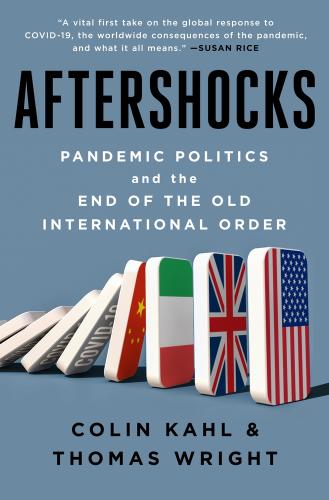
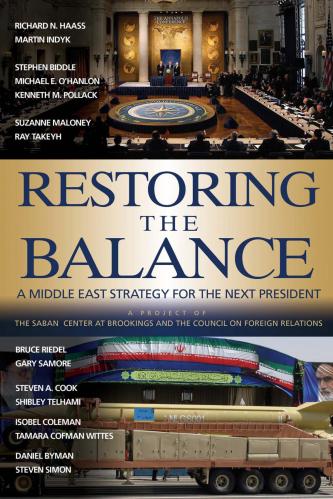

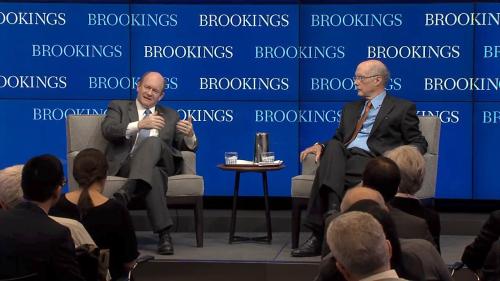
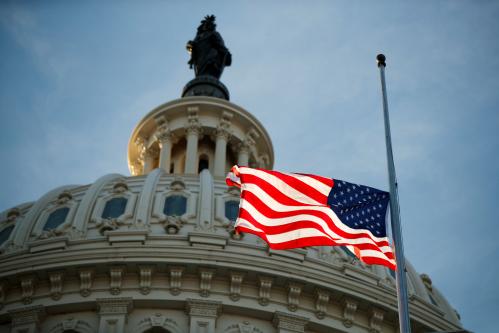
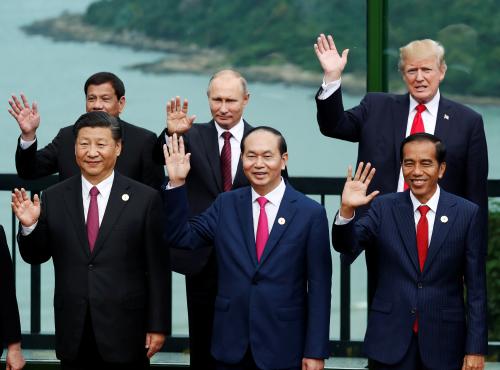
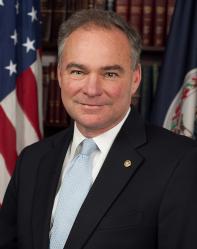



Commentary
A 21st century Truman Doctrine
July 28, 2017